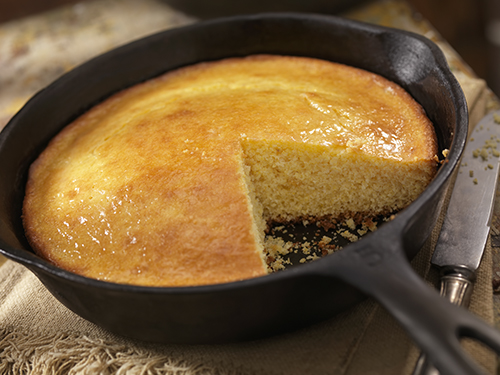Cast Iron Myths, Busted!
Nov 28, 2022

Many people remember Grandma cooking their favorite chicken or cornbread in a slick, black skillet. But as the resurgence of cast iron continues, folks are finding out that versatility is one of Lodge Cast Iron’s major benefits. Cast iron is incredibly durable, has a naturally nonstick finish, evenly distributes heat, and is seasoned for perfect flavoring!
With one holiday behind us and the next just around the corner, now is the time to debunk those myths that have been holding you back from cooking with cast iron.
Myth #1: You can’t use soap to clean cast iron.
Fact: Mild dish soap will not damage your cast iron. Large amounts of soap may remove some of the seasoning from your pan, but you can easily re-season it as needed.
Myth #2: Your cast iron will ruin if it rusts.
Fact: Rust can be easily removed by scrubbing the area with steel wool. To prevent your cast iron from rusting again, dry promptly after each use and finish with a light layer of cooking oil.
Myth #3: You can’t use metal utensils on cast iron cookware.
Fact: Cast iron is an incredibly durable material. Any type of utensil can be used, from silicone to wood to metal.
Myth #4: You can’t use cast iron on glass-top stoves.
Fact: Cast iron can be used on various heat sources as long as you handle with care. Do not slide the skillet across the stovetop and remove from the stove after cooking.
Myth #5: You can’t cook acidic or alkaline food in cast iron.
Fact: It’s true that large amounts of very acidic or alkaline foods can break down the seasoning when cooked for long amounts of time, but in small quantities, these foods are just fine to cook in cast iron. If it removes too much of your seasoning, simply re-season your skillet again.
Myth #6: You need to season a new Lodge cast iron pan.
Fact: Lodge Cast Iron cookware is pre-seasoned before it leaves the foundry. A thin layer of vegetable oil is sprayed onto the surface, and then the cookware is baked at a high temperature in a large oven.
Myth #7: Cast iron is unbreakable.
Fact: Cast iron is incredibly durable, but it’s not indestructible. Unlike other metals, cast iron will break before it bends, so handle with care just like any other piece of cookware.
Myth #8: Your cast iron cookware has a chemical coating that gives it the black patina.
Fact: While many companies do indeed use paint to achieve a black sheen, Lodge seasoning is 100% natural. Oil is baked on during the manufacturing process, and the black patina that remains is a carbon deposit left by the oil on the skillet.
Lodge Cast Iron is a workhorse in the kitchen and will make the perfect gift for a friend or family member. Plus, it is made right here in the U.S.A. Lodge Cast Iron is available at many Co-op locations, so call ahead for availability and pick one up before the holiday rush!
For more content like this, check out the latest issue of The Cooperator.
With one holiday behind us and the next just around the corner, now is the time to debunk those myths that have been holding you back from cooking with cast iron.
Myth #1: You can’t use soap to clean cast iron.
Fact: Mild dish soap will not damage your cast iron. Large amounts of soap may remove some of the seasoning from your pan, but you can easily re-season it as needed.
Myth #2: Your cast iron will ruin if it rusts.
Fact: Rust can be easily removed by scrubbing the area with steel wool. To prevent your cast iron from rusting again, dry promptly after each use and finish with a light layer of cooking oil.
Myth #3: You can’t use metal utensils on cast iron cookware.
Fact: Cast iron is an incredibly durable material. Any type of utensil can be used, from silicone to wood to metal.
Myth #4: You can’t use cast iron on glass-top stoves.
Fact: Cast iron can be used on various heat sources as long as you handle with care. Do not slide the skillet across the stovetop and remove from the stove after cooking.
Myth #5: You can’t cook acidic or alkaline food in cast iron.
Fact: It’s true that large amounts of very acidic or alkaline foods can break down the seasoning when cooked for long amounts of time, but in small quantities, these foods are just fine to cook in cast iron. If it removes too much of your seasoning, simply re-season your skillet again.
Myth #6: You need to season a new Lodge cast iron pan.
Fact: Lodge Cast Iron cookware is pre-seasoned before it leaves the foundry. A thin layer of vegetable oil is sprayed onto the surface, and then the cookware is baked at a high temperature in a large oven.
Myth #7: Cast iron is unbreakable.
Fact: Cast iron is incredibly durable, but it’s not indestructible. Unlike other metals, cast iron will break before it bends, so handle with care just like any other piece of cookware.
Myth #8: Your cast iron cookware has a chemical coating that gives it the black patina.
Fact: While many companies do indeed use paint to achieve a black sheen, Lodge seasoning is 100% natural. Oil is baked on during the manufacturing process, and the black patina that remains is a carbon deposit left by the oil on the skillet.
Lodge Cast Iron is a workhorse in the kitchen and will make the perfect gift for a friend or family member. Plus, it is made right here in the U.S.A. Lodge Cast Iron is available at many Co-op locations, so call ahead for availability and pick one up before the holiday rush!
For more content like this, check out the latest issue of The Cooperator.